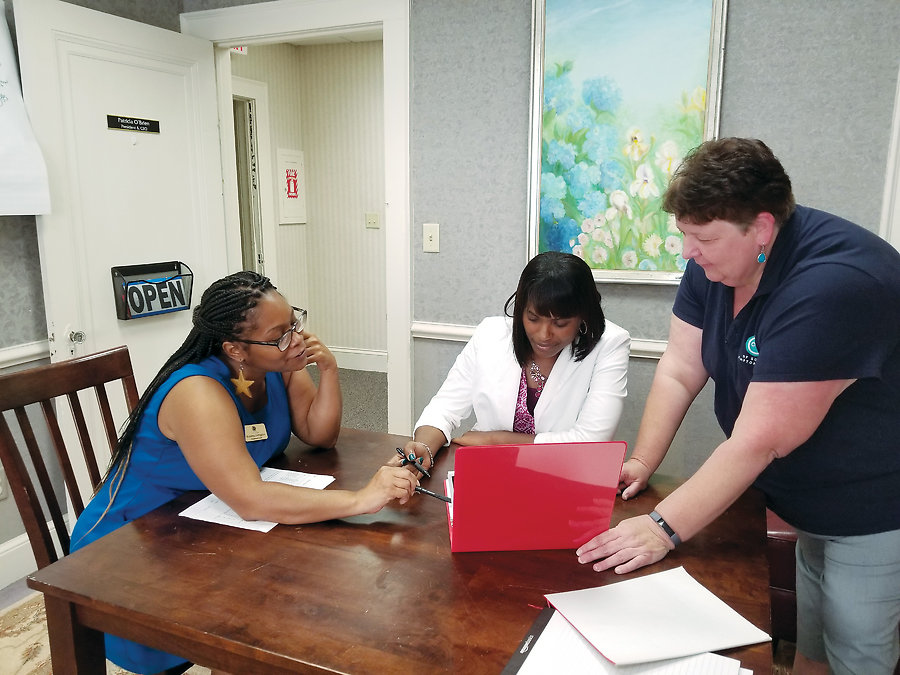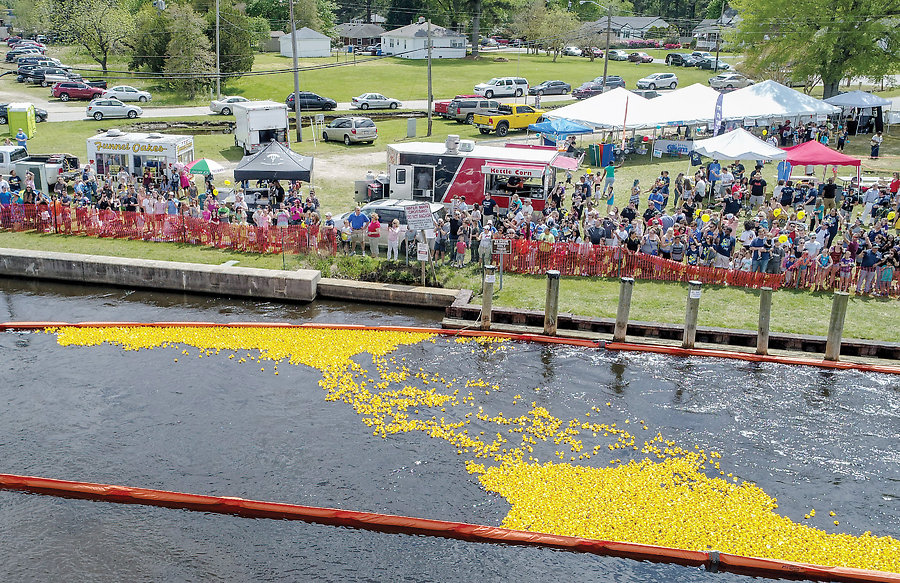CHILDREN'S HEALTH INVESTMENT PROGRAM OF SOUTH HAMPTON ROADS
Improving the future for less fortunate children
by Kay Carey

From left, Kisha Livingston, Keesha Knight
and President and CEO Trish O’Brien working to help children right from the start
Each spring, the Intracoastal Waterway at Great Bridge is overrun with thousands of little yellow rubber ducks. Why do they flock to Chesapeake? It's the annual signature fundraiser for Children's Health Investment Program of South Hampton Roads, or CHIP, an IRS 501(c)(3) charitable organization. The first lucky duck to cross the finish line wins $10,000.
"When I first came to Chesapeake and to CHIP, I asked the board of directors what organization in the community held a rubber duck race fundraiser," Trish O'Brien, the president and CEO of CHIP, says. "With all this water around, I felt sure somebody was doing it." But no one was, and the board approved the idea. The event has grown into a family-friendly festival, with lots of food, games, music, and fun - and of course, the headline event, the duck race itself. It's the kind of family-focused event that perfectly fits CHIP's role in serving two, and often three, generations at a time.
The parent/child relationship is the most powerful influence on children's early brain development, and CHIP programs are designed to help support parents in the toughest job they will ever love - raising their children. With just 2,000 days between a child's birth and kindergarten, new parents play a vital role in laying the foundation for their child's future health and success academically and professionally. The most critical developmental stages of life take place during these early days. By age 3, 80 percent of the brain's synaptic connections are already made.
CHIP's unique home visiting program pairs a certified parent educator with a registered nurse. Families are visited in their own homes, where parents are taught new parenting techniques and skills, the ages and stages of child development, and how to look for potential delays. They are also given information on specific child health topics like asthma or oral health issues, and much more. The CHIP program is voluntary, and although allowing a visitor into the home on a regular basis is not always easy for the families, the relationship they develop with CHIP staff can be invaluable. One mother expressed it this way: "My mother gave up on me, and now I am the mother who will never give up."
...the relationship parents develop
with CHIP staff can be invaluable.
One mother expressed it this way:
"My mother gave up on me,
and now I am the mother
who will never give up."
with CHIP staff can be invaluable.
One mother expressed it this way:
"My mother gave up on me,
and now I am the mother
who will never give up."
"All of the families we assist live in poverty," Trish explains, "but there are typically a number of issues that complicate their lives, such as being a single parent, lacking a high school diploma or GED, unemployment, substance abuse, domestic violence, lack of stable housing, and little or no reliable transportation." These are all risk factors for poor health and poor social and economic outcomes.
Trish took the helm of CHIP in 2006. Originally, the organization only provided home visiting in Chesapeake. Trish is most proud of the quality of staff and their services that led to the expansion of CHIP to Norfolk and Portsmouth - and soon, to Virginia Beach.
"I have worked with Trish in various roles since she began as executive director at CHIP," the chair of CHIP's board of directors, Lori Galbraith, says. "Trish's creativity and vision have been instrumental in expanding services to meet the needs of so many more children in the Hampton Roads community." Yet, Trish admits her biggest challenge as head of a grassroots agency is wearing multiple hats. "I might be doing building maintenance one minute and speaking to a prominent community business leader the next," she explains.

Thousands of yellow rubber ducks race down the Intracoastal Waterway in Great Bridge each spring
Trish and her husband, Dave, moved to Chesapeake in 2005, along with their Greater Swiss Mountain Dog, Rosie. They love to travel. One of their most enjoyable trips was to Istanbul, Turkey. Its incredible beauty and the scene of the Call to Prayer five times each day, which echoes throughout the city, were unforgettable. She also spends her off-time antiquing; her greatest find is a secretary desk that came out of the Virginia Governor's Mansion.
In 2007, Trish created the Sleeptight safe sleep education and crib distribution program in response to two infant deaths in families served by CHIP. Infant mortality in Hampton Roads is a critical health issue; in 2016, 32 babies in eastern Virginia died from sleep-related causes - things like suffocation and rolling on top of a baby. Nationally and in Virginia, unsafe sleep is the number one cause of infant death. The program has since expanded to become Sleeptight Hampton Roads, and CHIP serves as the backbone of the initiative.
CHIP's next big move is to an innovative shared spaces/shared services site for small, local non-profits. The model, embraced by other communities around the country, co-locates offices for small nonprofit organizations with limited budgets for overhead expenses and provides shared services such as reception, bookkeeping, and technology. In fact, CHIP is already sharing space with regional programs REACH (Reading Enriches All Children) and Champions for Children: Prevent Child Abuse Hampton Roads. Melynda Ciccotti, Executive Director of Champions for Children, says, "The shared space/shared services concept is one that offers formal and informal opportunities for collaboration among like-minded organizations. That alone justifies the concept. In addition, when all organizations share costs of services, such as heating and air, internet services, utilities and other expenses, the value of being a shared space partner greatly increases. It is indeed a win-win for all!"
"CHIP's vision is that every child enters school healthy and ready to learn and succeed," Trish says. "It might sound corny, but it's true that our children are our future. We need to give their parents and caregivers all the tools we can so that they and their children can reach their full potential."

